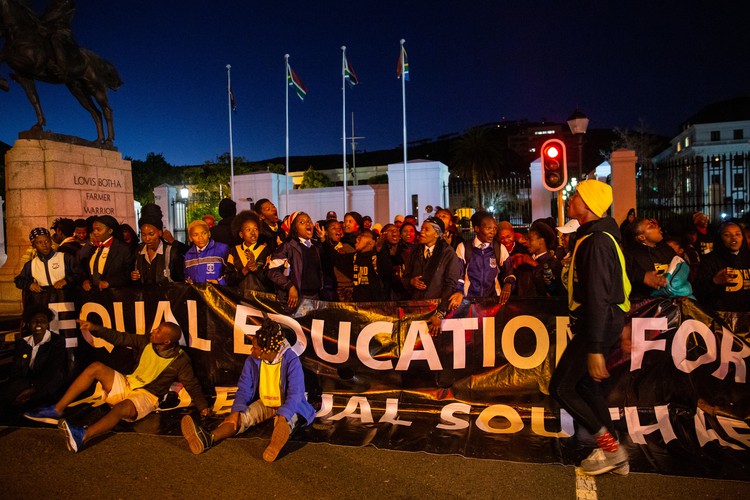
About 80 members of Equal Education, mostly school students, braved the cold weather and wind on Wednesday night to sleep outside Parliament in a protest over government’s failure to implement basic infrastructure for schools. Photo: Ashraf Hendricks
30 November 2018
“Please care about black learners education” and “Where do your priorities lie? In appealing or in fixing our schools?” These were some of the placards held up by Equal Education (EE) activists and students who had slept outside Parliament to demand school safety.
About 80 members of EE, mostly school students, braved the cold weather and wind on Wednesday night. They arrived around 8pm in taxis lined with mattresses.
On Thursday, they handed over a memorandum to the office of Minister of Basic Education Angie Motshekga, the office of the director general Hubert Mathanzima Mweli, and the office of the Western Cape Minister of Education Debbie Schafer.
“We are still fighting the fight for norms and standards which we have been been fighting since 2013. We are here to say the 2016 deadline was missed and students from Eastern Cape, Limpopo and other rural areas are still dying … for quality education 24 years after democracy,” said Western Cape EE Head Ntsiki Dlulani.
“We are here to hold our government accountable to deliver and implement the policies that they created themselves. We are here today to remind them that 2020 is around the corner for the norms and standards deadline. We do not want to see implementation in 2020; we want them to start now.”
The Department of Basic Education set Norms and Standards for South African school infrastructure in 2013, and provided its own deadline to fix the infrastructure standards by 2016, which it failed to meet. EE campaigned against the missed deadline and when the department failed to engage with it, EE took the department to court. EE won the case in the Bhisho High Court in July 2018.
Dlulani said they are asking the department to see that by 2020 all schools should have alarm systems, perimeter security, and access control. She said schools in Khayelitsha have no fencing; the security guards are not properly trained; and the schools are faced with learner to learner or learner to teacher violence.
“Learners are bringing weapons to schools … We have been attending safety conferences. The MEC was not there. No one talked about safety in schools which is a dismal failure,” said Dlulani.
“Black students are not taken seriously … The so-called future of this country is dying because of lack of decent infrastructure,” said Thembela Jacobs, a student at Cosat High School in Khayelitsha
Another Grade 11 student from Marian RC Secondary School in Elsies River, Chwaita Mpeqeke, said they have to walk with R1 in their pockets to avoid being beaten up.
“The aunties that cook in our school also serve as security guards. They sometimes accompany us to the bus stop because the security only works after hours when we have gone home,” said Mpeqeke.
“Gangsters are shooting each other around our school. They come to the bus stop, throw us with stones, and ask us for money … You are constantly in fear because you don’t know what might happen,” she said.
Head of the Western Cape Department of Education Anne Schlebusch said, “I can confirm that we did have a meeting with EE representatives in which we outlined a lot of the practical matters that have been raised through the committee. We will continue with our building and maintenance programme in partnership with other government departments to try and address the concerns.”
Accepting the memorandum in Parliament for the minister, official Thabi Motlala said the memorandum will be given to the minister to read and respond.
On Thursday, EE held similar action in Gauteng demanding better sanitation in schools across the country.
Learners from 15 schools around Gauteng marched from the Johannesburg City Library to the Gauteng Department of Education.
According to EE, a survey in 2013 revealed that toilets for 11 schools in Tembisa were not up to standard. EE then marched in 2014 to the department to demand decent sanitation.
“MEC [Panyaza] Lesufi promised to spend R15 million upgrading sanitation at all schools in Tembisa and a further R150 million on sanitation in the province,” a recent report by EE states. “However, serious sanitation issues remain, even in a wealthy urban province such as Gauteng.”
The report says that schools in 2017, which had received upgrades, still faced challenges and needed maintenance.
Angela Bukenya from EE said prior efforts to secure a meeting with the Department of Education after the 2017 findings were fruitless. “We resorted to doing the march today [Thursday] because the Department of Education have not responded to our meeting requests.”
The memorandum made several demands which centred around transparency in the procurement of contractors appointed in building sanitation in schools and maintenance. It also called for a better budget to be allocated by the department to save schools from having to use school funds to carry out upgrades.
Zandile Mahlangu, a grade 11 Learner at Asser Maloka Secondary School in Soweto, said, ”Our school toilets are broken. There is usually no toilet paper or soap.”
“Our water taps do not work. The toilet roof is broken. We do not get toilet paper or soap for washing hands, which is a health hazard,” said Elethu Sigudu, a grade 10 learner at Phomolong Secondary School in Tembisa.
A grade 11 learner at Phamufhindo Secondary School in Daveyton, Jeanette Mabunda, said, “Our toilets are always full of water [flooded] and we have to walk through the water. The toilets do not flush. No one is doing repairs.”
Chief of Staff for Department of Education Roche Mogorosi signed and received the memorandum.
Members of Equal Education sang songs and slept outside Parliament on Wednesday night. Video: Ashraf Hendricks